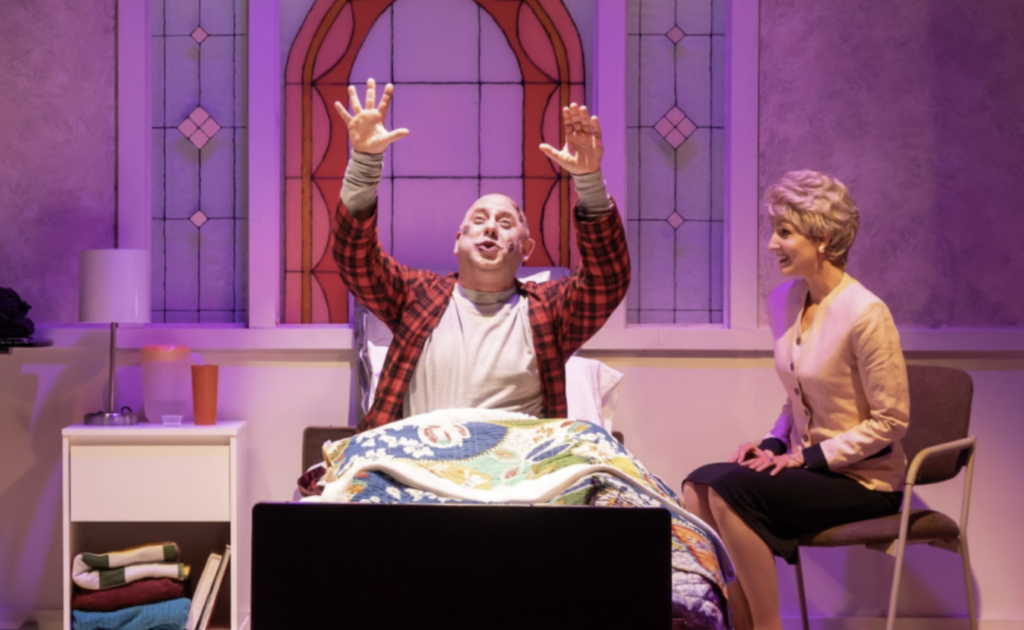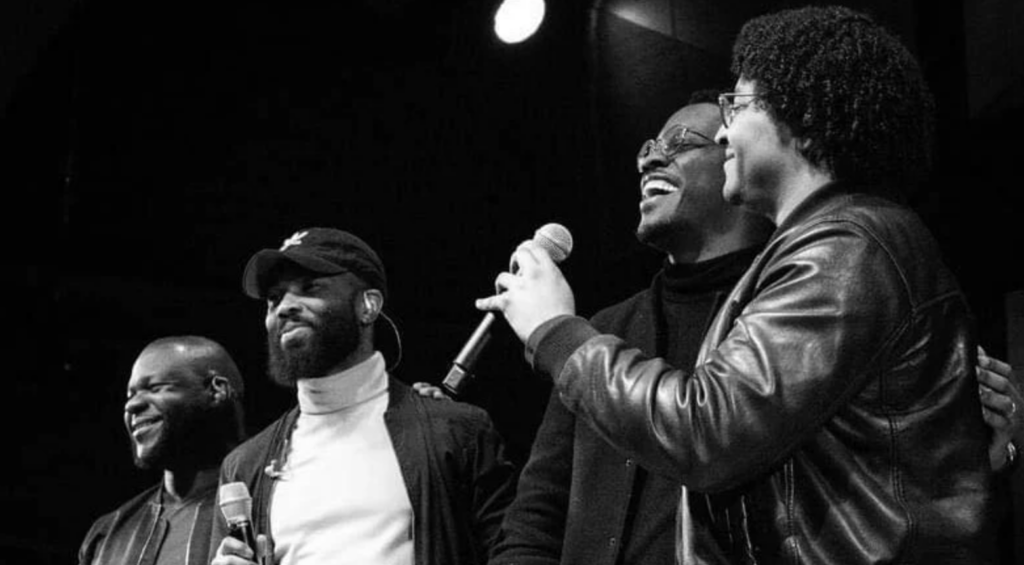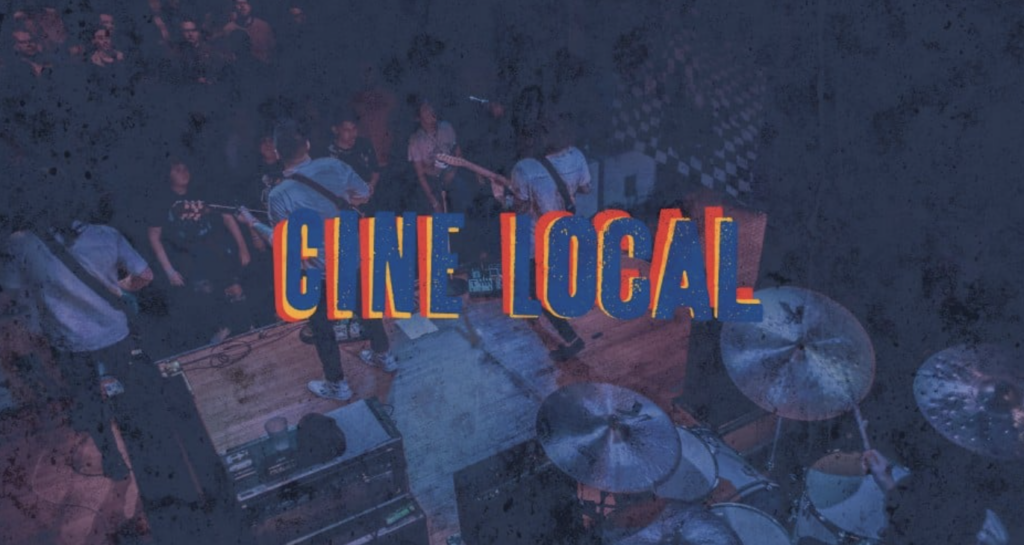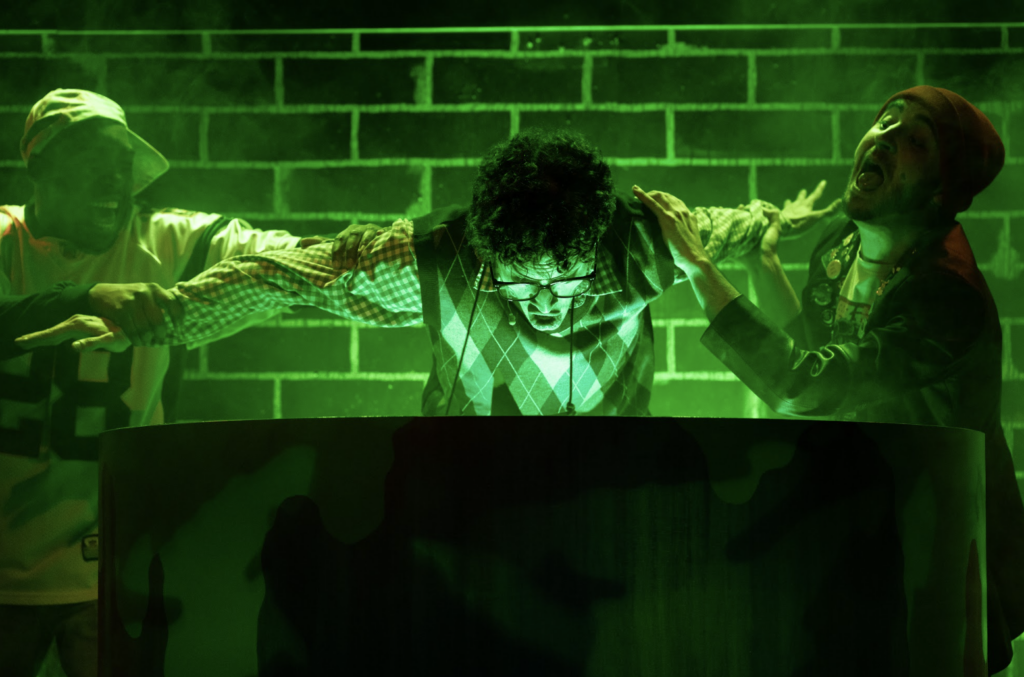Composer Jherek Bischoff on achieving fractured emotional weight when scoring new drama Exhibiting Forgiveness
Director Titus Kaphar’s debut feature film, Exhibiting Forgiveness, is currently receiving rave reviews. In it, “Tarrell (André Holland) is an admired American painter who lives with his wife, singer Aisha (Andra Day), and their young son, Jermaine. Tarrell’s artwork excavates beauty from the anguish of his youth, keeping past wounds at bay. His path to success is derailed by an unexpected visit from his estranged father, La’Ron (John Earl Jelks), a conscience-stricken man desperate to reconcile.
Tarrell’s mother, Joyce (Aunjanue Ellis-Taylor) a pious woman with a profound and joyful spirituality, hopes that Tarrell can open his heart to forgiveness, giving them all another chance at being a family. Tarrell and La’Ron learn that forgetting might be a greater challenge than forgiving in this raw and deeply moving film.”
The score for Exhibiting Forgiveness was composed by Jherek Bischoff, who also collaborated with Andra Day on a song for the film. It’s as raw and intimate as the film itself, and not for nothing is this Bischoff’s own debut, marking the first time he’s composed on his own.
We spoke with composer Bischoff to discuss the new film, collaboration, and his career.
The Pitch: Given that you have a good amount of experience scoring, what is the process working with a new director as opposed to someone who’s been around for a bit?
Jherek Bischoff: Well, you know, this is actually my first feature length, which is a solo outing. I’ve done a lot of film work, but it has been primarily with co-composing with my friend Craig Wedren, who does Yellowjackets, and he’s got a ton of big films and stuff like that. One of the reasons I moved to Los Angeles was actually him saying, “If you move here, I’ll teach you the ropes and, and try to give you credit where I can, and you can come and go as you please, and I’ll teach you the ropes.”
I certainly got experience that way, but this is my first feature film. What you get with someone that’s done a lot–that has maybe directed a lot of films is if they like it, then you can feel confidence in what you’re doing and you can move forward with confidence. A first time director, they might not know exactly what they want, but in the case of Titus Kaphar, he’s a veteran artist.
He understands the process. He’s fairly new to collaboration because painting is such a solitary art form, typically, but when we first began speaking, I realized he’s actually a really, really gifted collaborator. Once he believes in you and trusts you, he just–I was at times trying to be directed more because he was just like, “Man, you’re doing everything right. Everything sounds great,” and I was like, “Well, cool, but like, are you sure?” and he’s just like, “Man, it sounds so good.”
So, I decided to just fully trust him back like any collaborator would and it worked out really well.
You collaborated even further when you record a song with Andra Day, who stars in the film. Does that help you get further into the headspace of a film such as this?
Yeah, for sure. In the film, Andra Day, who is a wonderful actor as well as an R&B superstar, plays a role that has a character that, that she plays the role of a singer and a wife to the lead character. The figuring out of that song was interesting because it needed to live outside of the score, but it also needed to feel of the same world, and I wasn’t sure where that line was, exactly.
The whole process of this–making the score–was interesting because I had just read the script, made probably 20-something pieces of music just to get the gig, and I’d say about 80% of the film is actually those original demos that I created just, just to get the gig. I thought I would start fresh once I actually got the gig, but it ended up being most of the music for the film and the song is just one of those demos with Andra singing over the top of it, which links the score and her and the score and the song in a cool way, because it was a tiny bit of an outlier in my demos, but it also was recorded when I was in the same headspace and, and just sitting in my studio, playing a bunch of instruments, trying to figure stuff out.
Andra and I went into the recording studio in Brooklyn for about five days, just working on stuff, trying to figure out what the song could be, and we were listening to these demos and stuff that she had brought in, and Titus came in at the end of a film day, and we were listening together and he just was like, “Why isn’t that the song?”
That’s one of those actual director moments where we were so wrapped up in trying to get it right and he walked in and was just like, That’s the one.” That gave us the confidence to move forward with that and then once Andrea started putting our vocals over it? I haven’t heard a whole lot of that kind of singing over that kind of music before, and it just works so well, and it was amazing to watch Andra work. Yeah, so it was an interesting process, but I feel like, when is it ever not interesting?
Interesting is a very good way to describe your career, given just your work with Craig Wedren. He has done so many different things, with him coming out of that rock and roll world as having been part of Shudder to Think. He’s done everything from the theme to The State to, like you said, Yellowjackets and everything in between. What does working with someone whose soundtrack career and scoring career doesn’t seem to operate in one particular genre help you learn as a composer yourself?
Part of the reason why Craig and I are so close and work well together is that we’re cut from the same cloth, basically. We both come from bands. We’re both interested in constantly learning and pushing ourselves. We were were never intimidated by by new things. Instead, it’s excitement to figure things out.
I think he saw in me that I was writing German opera and playing in weird experimental rock bands and making theater music and arranging for orchestras and arranging for different pop artists and just doing everything under the sun. What drew me to film music and seeing Craig firsthand was that my own path had been so buried artistically within the music. Sometimes, it’s a bit hard to consolidate all of the fanbases into people, realizing that you’re the person behind all that stuff, you know?
Like, there are not very many Jherek Bischoffs in the world, so it shouldn’t be hard for people to figure out that I write German operas and electronic music and blah, blah, blah, blah, blah, blah, blah, blah, blah but it’s hard for people to figure out. People typically want you a little bit more in a box and I just felt like film music is one of those few places where you can be continually challenged.
You can work on a comedy, making comedy music, and then you can work on a horror film and making terrifying music. You can be doing dramas, and you’re playing all these different instruments. You’re doing all this stuff, and because it’s film music, it’s suddenly under this umbrella, and it’s more accepted to be adventurous and keep pushing yourself.
You’re just known as a film composer at that point, not as an eclectic weirdo who can’t keep still. That’s what drew Craig and I to work together. We really share a lot of that same reason for doing film.
What led you to use felt piano on this score?
That was specifically a Titus move. I love the sound. It’s a pretty used thing these days in film. When he first said it, I was a little bit like, “Man, I’d love to try to find maybe potentially a fresher approach to doing it,” but I also knew that I’m a horrible pianist. I was just like, “Oh no, he wants a piano score.” This is what I’ve been dreading most is someone saying, “I want a piano score,” but again, I took it as a as a challenge.
What I am realizing in retrospect the very first demos that I sent to Titus were kind of in the sound world that I’m more practiced in, which is a more large chamber sound up to orchestra and things can be a little or a lot bit lush. I mean, my last record was about time I spent in an underground wall that had a 45-second reverb decay. I’m a fan of reverb and his first note upon the first draft that I sent was, “Can you strip it back and take all the reverb off?”
So I did that and I was pretty pleased with how it was coming out and he kept reinforcing this idea of intimacy and wanting there to not feel like there’s two people on screen, and there’s 60 people on stage somewhere. It was like, maybe if there are two people on screen, that’s just two instruments playing and really pulling things back and making them mirror what was happening on screen because he likes other scores that have that sound or whatever, and realized that it’s actually an extremely smart way of thinking.
He’s thinking as a painter: he wants to hear texture, he wants to hear all the mechanics, he wants to hear all the cracks and creaks and crevices of the sound and so I took that as inspiration to do that with every instrument. The piano was extremely close mic’d, to the point of, I’d play the bass line as one track and put the microphones an inch away from the hammers for the bass notes. Then I’d play the harmony line and do the same – put the mics right up on that. Then I do a melody line and do the same, and then pan it out and have what sounds like just one person playing a piano, but it’s actually three different takes and doing that, I could find all these rhythms in the release of the notes and how each different piano I used was reacting to different things and really hyper-focus on all these “flaws” that actually brought a lot of intimacy.
I did that with violin. I would really close-mic it, with no beat reverb, or if there was reverb, it was not noticeable. The same goes for cello and upright bass—I just tried to really make it sound in your head intimate, colorful, and with a lot of personality instead of overfilling.
I mean, I’m not a great player of any instrument other than bass, really, but I play a lot of instruments, and I ended up playing most of the instruments on the score and as someone who is not a great string player, I usually layer up the strings pretty big just so that I sound decent. It’s like a safety net. But in this case, he really wanted to hear all the flaws, so I was like, “Well, I can give you flaws,” and it actually worked to our benefit in this case. I knew what he was looking for. The way I was playing vibrato and the way I was bowing, I could feed off of what he was wanting textually and feeling wise and so I was just like, “I feel like I could do this myself.”
That hearkens back to your release, Composed, which you put together one thing at a time. It’s an amazing ability to be able to pull all of these different things together. In that case, you were using that to create something very big and in this case, you’re using it to create something very intimate. That’s a great juxtaposition.
It was a trip, and I was a bit intimidated by it, but at the same time, I think it’s one of these long-lasting influences that will be in my work. Maybe down the road, when I’m making my next record, some of this stuff will be washed out and then you’ll have one thing that’s just super stark and upfront in the mix with it or blending these new sounds that are in my tool belt. I think it’ll stick around for a while for sure.
Now that you have done your first solo film score, what lessons did you learn that you’re probably going to take to the next one you do?
In the last couple of films I’ve worked on, I’ve had a script pretty early on before shooting. A skill that I didn’t realize that I was building, but I realized is a real asset, is from my time working in theater and opera, which is the skill of reading a script and it might not be the world that ends up being, but you can fully imagine a world and create work based on that feeling of what that world is going to be.
Through doing the opera stuff, it’s like film composing–every beat has to be hit, every lyric has to be followed, all this stuff, but you’ve got no picture, so you just have to make it up in your mind and see the whole thing. When I’ve read these scripts, I’ll just immediately sit down and just make as much music as possible, whether I have the gig or not.
And in all the cases, it ends up being like, if not the building block of the score, way more than the building block. In this case, about 80% of the film is these initial things just from from reading the script.
Next film, what I would hope for, is that I’ll be in the in on the process early and be able to continue with that because I feel like it’s working well and it’s it’s a fun way to work and it gives directors a chance to build the sound world as well as the visual world at the same time. It’s just a great process.
Exhibiting Forgiveness is in theaters now.





